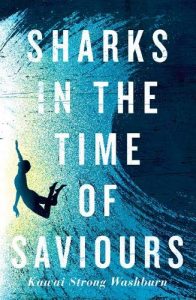 Published by MCD US/Canongate UK, 3/5 March
Published by MCD US/Canongate UK, 3/5 March
384pp, hardback, $27/£16.99
Reviewed by Elsbeth Lindner
A poem to Hawaii, a working-class saga, a tale of three siblings – their separate trajectories and combined strengths: Kawai Strong Washburn’s debut is all these things. A difficult-to-categorize fusion of myth and grit, it contrasts the earth deities of the 50th state with the daily grind of poverty and survival there, and comes up with a moving, original fusion of realism and the spiritual.
At the heart of its story stand the Flores parents, Augie and Malia, living hardscrabble lives of manual labor and overstretched budgets while tending to their three bright children. Against the wild, abundant background of jungle, surf, volcano and beach, Dean, Kaui and Nainoa grow up in a milieu of love and expectation. Each child is talented – Dean on the basketball court, Kaui in the classroom. But its Nainoa who seems to shine the  brightest. The spirit of the islands lives in him, in his special attunement to place and ancestry. When, as a child, he falls overboard during a pleasure trip in shark-infested waters, he is saved and returned to the craft by the sharks themselves.
brightest. The spirit of the islands lives in him, in his special attunement to place and ancestry. When, as a child, he falls overboard during a pleasure trip in shark-infested waters, he is saved and returned to the craft by the sharks themselves.
Washburn presents Nainoa’s magical dimension not only with restraint but with credibility and a sense of darkness. Gifts of healing and sensitivity might be a burden as much as a blessing, and Nainoa’s promising future becomes overloaded by doubt, pain and isolation, pushing him to the brink.
This darkness extends to all the characters, as Washburn includes multiple larger issues – race, complicated sexuality, the difficulty of living up to parental pressures, environmental despoliation. The plot is a roller coaster of effort, disappointment and resurgence that touches on both Flores generations, and the islands themselves which are the larger character in the story. Ravaged by agribusiness and tourism, Hawaii may have been exploited and blocked from its essence, but may yet rediscover its force, rhythm, culture and ancestry.
There are obvious risks in attempting such a sweeping, big-picture narrative, yet Washburn’s commitment and steady voice lend depth and conviction. This is an immersive, unpredictable, lyrical tale, strong on immediacy and the overwhelming beauty and power of its geography. Linking the modern and the timeless, Washburn’s writing is fresh, forceful and to be relished.
